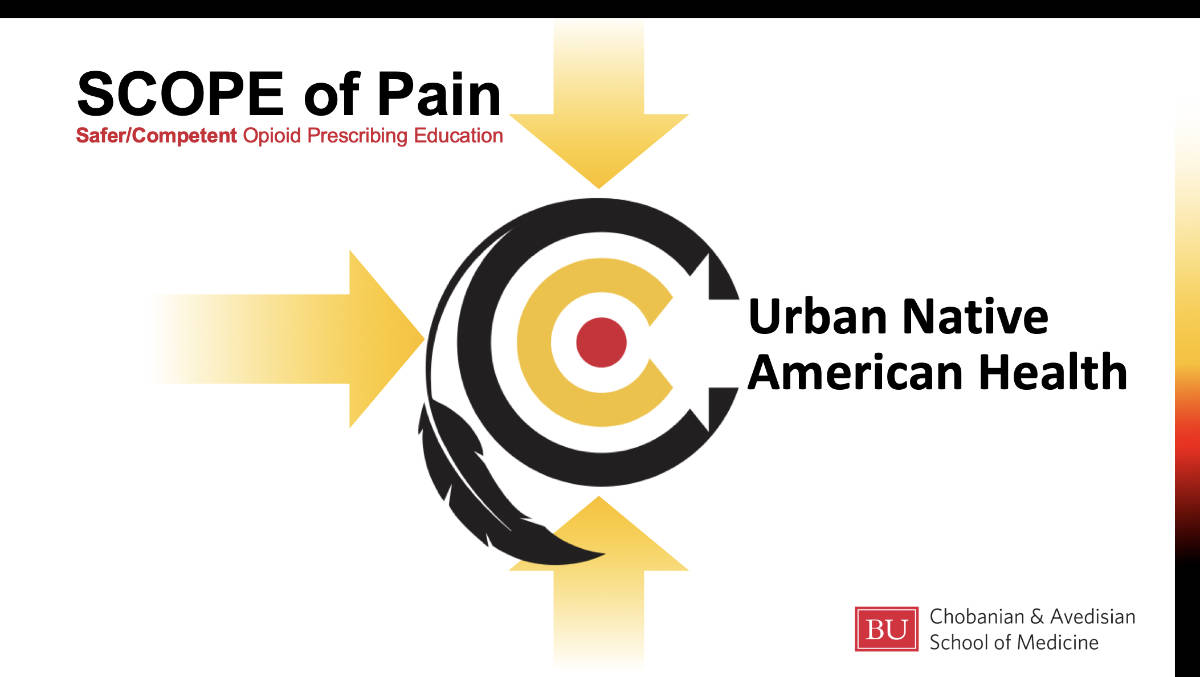Core curriculum
Archived webinar
Available through July 17, 2024


In addition to the core SCOPE of Pain content, this archived webinar discusses the unique challenges faced by Native Americans as they straddle two worlds/cultures, particularly in the delivery of health services and payment issues.
- According to the U.S. Census, approximately 71 percent of American Indians and Alaska Natives live in urban areas
- Chronic pain and substance use are common problems in Native American populations
- There are important and unique considerations when caring for Native American patients who suffer from pain and/or addiction
- Many clinicians in urban areas are not aware of a patient Native American heritage and culture or the specific resources that might be available to them
Course Director and Speaker
Daniel P. Alford, MD, MPH
Professor of Medicine
Associate Dean, Center for Continuing Education
Boston University Chobanian & Avedisian School of Medicine
Speakers
Daniel Tobin, MD
Associate Professor, Department of Medicine, Yale School of Medicine
Nichol Brewer-Lowry, MSc
Healthcare Administrator; Member, Lumbee Tribe of North Carolina
Jacqueline Vorpahl, PhD
Licensed Clinical Psychologist, Private Practice; Member, Choctaw Nation of Oklahoma
Overview
- Register
- Archived webinar
After registering you can then watch the archived webinar: Safer/Competent Opioid Prescribing Education. It is 2½ hours long.
- Post-assessment survey and evaluation
After watching the webinar, you can take the post-test. You will be able to receive your continuing education certificate by earning score of 70% or better on the post-test, and completing the online evaluation.
- Follow-up online survey
There will also be an online follow-up survey distributed two months after completion of the program in order to further measure participants' changes in knowledge and behavior.
What is this online training about?
SCOPE of Pain is a series of continuing medical education/continuing nursing education activities designed to help you safely and effectively manage patients with acute and/or chronic pain, when appropriate, with opioid analgesics. Our program consists of a free 2-module, case-based online activity and live conferences held around the US. Through the case of Kathy James, a 32-year-old who has a displaced right femoral neck fracture due to a motor vehicle crash, you'll learn how to
- Optimize safety when prescribing opioids for acute pain
- Determine when opioid analgesics are indicated for chronic pain
- Assess pain and prescription opioid misuse risk
- Educate patients about opioid risks and realistic benefits
- Monitor patients on opioid therapy for benefits and harms
- Assess and manage worrisome opioid-taking behaviors
- Safely taper long-term opioid therapy
- Identify and manage patients with an opioid use disorder
Who is this for?
Physicians, nurse practitioners, registered nurses, physician assistants, nurses, dentists, pharmacists, and allied health professionals whose practices manage acute and chronic pain.
Partners
These activities were planned in collaboration with the Federation of State Medical Boards (FSMB).
Disclosure of support
This activity is supported by an independent educational grant from the Opioid Analgesic REMS Program Companies. Please see https://opioidanalgesicrems.com/Resources/Docs/List_of_RPC_Companies.pdf
for a listing of REMS Program Companies. This activity is intended to be fully compliant with the Opioid Analgesic REMS education requirements issued by the US Food and Drug Administration.
Date of Original Release: 04/11/1999
Date of Expiration: 07/17/2024
Modal
SCOPE of Pain
© 2024 Trustees of Boston University. Site by Root802.





